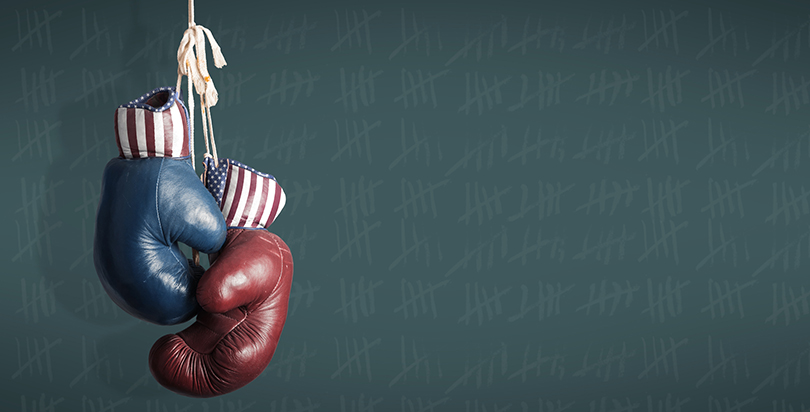Bradford — The Politics & Partisanship of America’s Education Reform Debate: A Growing Blue-Red Divide

We also have a partisan problem.
This may be the one that’s easiest to see — though it is perhaps toughest to fix — and it spilled out into the street in the wake of Hillary Clinton’s presidential defeat. It now charges the national debate, around all policy, with a third-rail-like electricity on both sides of the aisle.
Party allegiance is the new litmus test not just for political philosophy, but for personal belief and social inclusion. Answering the wrong way on the wrong question not just on reform — but on anything — carries the weight of possible ostracism from both the left and the right. My own lens on this is through the tribe of Democrats, because those are the primaries in which I vote and the affiliation of most of the folks who are close to me. Folks I admire and from whom I seek counsel and direction during difficult times.
I understand it. I found the last presidential campaign distasteful. I rejected the division and the acrimony that typified the exchange, particularly where race was concerned. I tell folks sometimes that black lives matter — and that since I have one, it matters a whole lot to me — but the electoral process left me confused about whether our leaders actually agree with me. I ultimately supported Clinton despite my firm belief that she would appoint a secretary of education determined to make our lives harder, not easier. In the professional sense, I voted against my own interests because I thought it might be best for America.
But I also spend a lot of time traveling the country, which means, unlike many of my peers, I am not confined to either of the progressive coasts. At 50CAN, four of the five states I manage — Tennessee, South Carolina, North Carolina, and Georgia — are politically a deep crimson.
Despite their red hue, one thing doesn’t change as I move between them: how desperately children need great schools to ensure they reach their full potential. And though these states also bring the problems of rural education to the forefront, there are plenty of black and brown kids in cities who need our help as badly as any kid in Bed-Stuy, Brooklyn, does. Blue state or red state, our kids need all the help they can get, and they need it from everyone.
This is why I find the advance — or the retreat, depending on your view — by so many of my reform brothers and sisters to their respective hard rights and lefts not only troubling, but counterintuitive. And, in the long term, destructive.
It’s a pivot of safety, tribalism, and sameness, one of ease and elitism when our children need us to behave in precisely the opposite fashion, running toward one another instead of away.
We don’t have an education reform movement because liberal Democrats believe in civil rights. And we don’t have one because conservative Republicans believe in market solutions, low regulation, and freedom. We have one because they could believe in them both, at the same time, together, and at the same table. The golden age of “reform” that folks associate with President Barack Obama exists only because of a history of this sort of collaboration.
It flowered when President Bill Clinton and a Republican Congress came together on charters. It grew further with President George W. Bush and the late Sen. Ted Kennedy, who together built and passed the No Child Left Behind Act. It expanded charters in places like Newark, where Republican Gov. Chris Christie and Democratic Mayor Cory Booker somehow managed to work together to make change.
Republican Gov. George Pataki, with the help of Democratic Rep. Floyd Flake, passed New York’s charter school law in 1998. Democratic Assemblywoman Polly Williams and Republican Gov. Tommy Thompson joined to create the Milwaukee Parental Choice Program, the country’s first.
Without a willingness to look past party with an eye toward the goal of improving education for our children, none of this would have been possible.
Much of what I read and see now seems ignorant of this history. And not just ignorant of it — dismissive, detached, and arrogant to it. There isn’t a progressive state where a teacher evaluation framework, tenure reform law, equitable funding formula, charter, or choice program passed without the support of both Democrats and Republicans. A retreat from the political realities of what it takes to make change — real change, not just the kind that makes partisans happy, but the kind that actually alters culture in a way that unmakes what is broken so something better can be created — isn’t just selfish, it’s self-interested. And it ignores the most important of factors: that change of this kind, and of this scale, can’t be done alone.
We don’t need new edges; we need a new center. So consider this: If your partisan values are more important to you than your education reform values, perhaps you should ask yourself if you are in the right place, at the right time, doing the thing that is best for you and your beliefs.
I happen to be an ed reformer first — my moral and professional compasses point in the same direction, and I act in a fashion that is aligned around changing policy for kids. This is also to say I am a Democrat second, and being one informs my view on reform — particularly on issues of equity — but is in service to that view. Not everyone sees the world this way. In fact, many people I know well don’t see it this way at all. So if you’re a Democrat first, or a Republican first, or a partisan first, and that is what matters most to you, I support that fully. The country is a mess right now, and we need political reform as much as we need education reform.
But it’s also possible that, if you feel that way, the Democratic National Committee or the Republican National Committee would benefit more from your decision-making right now than a boy on a corner in Bridgeport who just needs you to be on one side — and that side is his. He’s actually the last person who needs you to be a partisan — steeped in what you won’t do and closing off policy opportunities that make you uncomfortable because of your political beliefs — because in the end, it’s his life, not yours, that depends on it.
We should all see the world through his eyes when thinking about this.
I encourage everyone to reflect on the life of Martin Luther King Jr. and his efforts to pass the Civil Rights Act when thinking about our partisan problem. King worked with many people to pass the act. Some of those people were racists. And the most notable of them might have been President Lyndon Baines Johnson himself. Johnson’s biographer Robert Caro described him as a connoisseur of the word “nigger” who tailored its use and inflection to the home regions of members of Congress. As Obama noted in 2014, “During his first 20 years in Congress, he opposed every civil rights bill that came up for a vote, once calling the push for federal legislation a farce and a shame.”
The lesson here isn’t necessarily about Johnson’s motivations, or even the sincerity or veracity of the change he underwent that made him a supporter of civil rights. It is instead about King’s single-minded focus on the goal of equality for black people, and the relentless pursuit of that goal through political disconcert and social pressure. And in this case, it included his willingness to work with a man — one fluent, skilled, and practiced in the casual use of the greatest insult to black people — who offered him not comfort, but the chance to improve the lives of those very same people. The history of minorities seizing power in America has always been colored by these crushing concessions. King’s discomfort, I think, is of the sort we have to live with now if we want to make progress in these difficult political times.
Education reform isn’t about how you may or may not feel at cocktail parties or your own political or personal proclivities. It is about kids dying civic and physical deaths in schools that don’t work for them. Progress, real progress, never feels good. And it’s always uncomfortable, because change is uncomfortable, even when it’s for the better.
Read the previous chapters: Why Being ‘Right’ Isn’t Enough and Why Charters Need a Suburban Strategy.
Get stories like these delivered straight to your inbox. Sign up for The 74 Newsletter

;)
